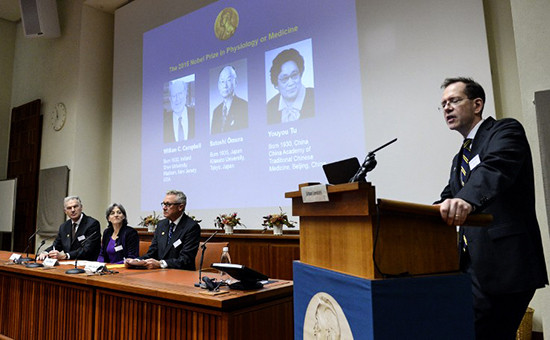
Photo: AFP
The Nobel Prize in Physiology or Medicine in 2015 were three scientists: half of the prize was awarded to William Campbell and Satoshi Omura for the development of a new method of treatment of infections caused by parasitic worms, the second half – Yu the development of a new method for the treatment of malaria.
The winner announced Lendal Urban, a professor of genetics, the secretary of the Nobel Committee for Physiology or Medicine. The ceremony was held at the Karolinska Institute in Stockholm, the committee which selects the winners of the award in this category. According to organizers of the event, including 327 scientists, nominated for the Nobel Prize in Medicine, 57 get it the first time.
The Nobel Prize in 2015 will amount to 8 million Swedish kronor ($ 952 kyr.).
In 2014, the Nobel Committee awarded the Prize for Physiology or Medicine, and American John O’Keefe Norwegian Physiology – spouses Mai-Britt and Edvard Moser for brain research and the discovery of cells responsible for the positioning system, which allows the body to orient themselves in space.
In the history of the prize award in the field of medicine and physiology were awarded 105 times, its winners were 207 scientists, including 11 women. 38 times Prize in Medicine winner gets one. The average age of the recipients was 58 years.
A few days before the announcement of the Nobel Committee, Thomson Reuters has published a traditional outlook, in which the best chances to win the prize in medicine were the authors of the three papers. Among them was named a graduate of Moscow State University and director of the American Ludwig Center cancer immunotherapy Alexander Rudenskiy (USA) and his colleagues Shimon Sakaguchi (Japan) and Ethan Shevach (USA).
They studied the work of regulatory T cells It is playing an important role in the immune response, and Foxp3 protein, which is responsible for the development and operation of these cells. The results of this work are important for research into the causes of autoimmune diseases, allergy, inflammation and other processes.
Among the possible nominees this year was also named Jeffrey Gordon, who has studied human intestinal microflora and its impact on nutrition, obesity and general the health of the body. Other likely contenders – Katsuoshi Mori and Peter Walter, who studied the system providing “quality control” cells.
No comments:
Post a Comment